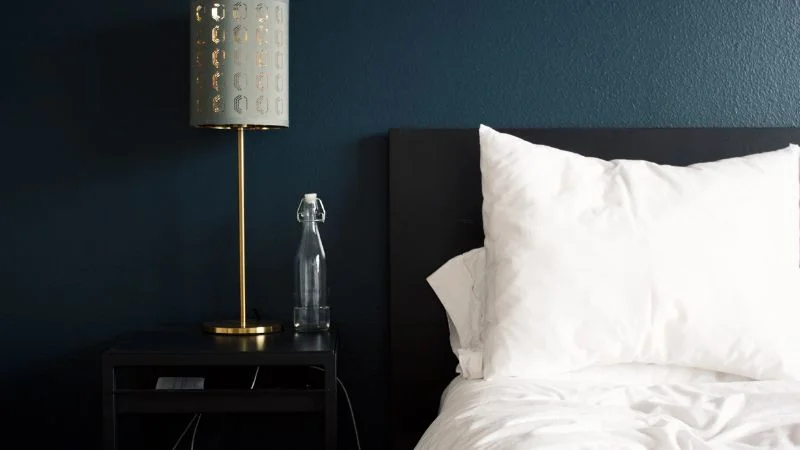Why Are Hotel Sheets So Crisp And Comfortable? Here’s How Yours Can Be Too

As participants in Amazon Associates and other programs, we earn from qualifying purchases. This comes at no additional cost to you. For more details, see our Affiliate Disclosure.
If you’ve ever stayed at a hotel, you may have noticed the sheets are notably crisp, cool, and oh-so-comfortable. It’s no secret that hotel bedding can make a big difference in your sleep quality. But have you ever wondered why hotel sheets are so crisp and comfortable?
Hotel sheets are crisp & comfortable due to high-quality cotton, high thread count, and professional laundering. You can replicate this experience by investing in high-quality sheets, washing them carefully, and using fabric softeners.
A few factors contribute to the luxurious feel of hotel sheets, including the thread count, fabric type, and the way they are laundered. But is it possible to replicate that hotel bedding experience at home? In this article, we’ll delve into the secrets of hotel bedding and share tips on achieving that same level of comfort in your bedroom.
The Secret of Hotel Bedding: Understanding Thread Count and Fabric Type
The thread count and fabric type of hotel sheets play a vital role in creating a luxurious sleeping experience. High-quality cotton with a high thread count creates a crisp, cool, comfortable, and inviting feeling. However, it’s not just the thread count that matters, but also the type of cotton used, such as Egyptian cotton or Pima cotton. These types of cotton have longer fibers, which can produce a softer and more durable sheet.
Here are some key points to keep in mind when it comes to thread count and fabric type:
- Thread count refers to the number of horizontal and vertical threads in one square inch of fabric.
- Higher thread count sheets generally feel softer and more luxurious.
- Look for sheets made from high-quality cotton such as Egyptian or Pima cotton.
- Cotton with longer fibers produces a smoother, softer, more durable sheet.
- Fabric blends that include cotton can also be comfortable, but paying attention to the percentage of cotton used is important.
- Synthetic fabrics like polyester may not feel as comfortable as natural fibers.
By understanding the importance of thread count and fabric type, you can choose bedding replicating your bedroom’s luxurious feel of hotel sheets.
The Importance of Laundering: How Professional Cleaning Makes a Difference
Hotels invest in professional laundering services to ensure their sheets are impeccably clean and soft. Commercial-grade washing machines, high-quality detergents, and expert laundering techniques all contribute to the longevity and comfort of hotel sheets. These high-tech washing machines can agitate the sheets more thoroughly than a home washing machine, resulting in a deeper clean. In addition, the detergents used in professional laundering often contain special enzymes that can break down the sweat, body oils, and other stains that can accumulate in sheets over time.
Furthermore, hotels wash their sheets daily or after every guest to maintain cleanliness and freshness. This frequent washing helps to eliminate bacteria or germs, which is particularly important for individuals with allergies or sensitive skin. By regularly laundering their sheets, hotels can provide guests with a fresh and comfortable sleeping environment, contributing to a better overall experience.
While replicating the level of professional laundering used by hotels may be difficult, there are steps you can take at home to maintain the freshness and comfort of your sheets. Using a mild detergent, avoiding overloading the washing machine, and air-drying or using a low heat setting in the dryer can help maintain the quality of your sheets over time.
Choosing the Right Sheets: What to Look for in High-Quality Bedding
Choosing the right sheets can make a significant difference in the quality of your sleep. Here are some factors to consider when looking for high-quality bedding:
- Material: Look for sheets made of natural materials such as cotton, silk, or linen for better breathability and comfort.
- Thread count: While higher thread counts are often associated with better quality, the actual thread count isn’t as important as the fibers’ quality.
- Weave: Percale and sateen are the two most common types of weaves used in sheets. Percale is more breathable, while sateen is more luxurious and soft.
- Breathability: Look for breathable sheets that allow air to circulate to keep you cool and comfortable.
- Durability: High-quality sheets should last for years with proper care, so consider investing in durable and long-lasting sheets.
- Softness: The softness of sheets can be subjective, so it’s important to feel them before purchasing them.
- Care: Check the care instructions before purchasing to make sure they can be easily washed and cared for.
- Price: While high-quality sheets can be a significant investment, they can also last for years, making them worth the cost in the long run.
Considering these factors, you can choose high-quality bedding that meets your comfort and durability needs.
Washing Tips and Tricks: How to Care for Your Sheets at Home
Caring for your sheets properly is essential to maintaining their quality and durability. Here are some tips and tricks for washing your sheets at home:
- Follow the instructions: Always check the care label on your sheets before washing them to ensure you follow the manufacturer’s recommendations.
- Wash in cool water: Hot water can damage the fibers of your sheets, so wash them in cool or warm water.
- Use a gentle detergent: Avoid harsh detergents or bleach, which can weaken the fibers of your sheets. Instead, opt for a gentle, mild detergent.
- Avoid fabric softeners: Fabric softeners can leave a residue on your sheets, making them less absorbent and reducing their breathability.
- Dry on a low heat setting: Avoid high heat settings when drying your sheets, as this can cause shrinkage and damage to the fibers. Instead, use a low heat setting or hang them to dry.
- Remove promptly: Remove your sheets from the dryer promptly to avoid wrinkles and minimize the need for ironing.
- Iron if necessary: If your sheets are particularly wrinkled, iron them on a low heat setting to smooth out the wrinkles.
These tips and tricks can keep your sheets looking and feeling great for years.
Fabric Softeners and Other Accessories: Enhancing the Comfort of Your Sheets
Enhancing the comfort of your sheets can be achieved through various accessories and techniques. Here are some ways to add an extra layer of comfort and luxury to your bedding:
- Fabric Softeners: Fabric softeners can make sheets feel softer and more comfortable by reducing stiffness and adding a pleasant scent. However, they can also leave a residue that can reduce absorbency and breathability, so use them sparingly and avoid using them on towels or other fabrics that need to be absorbent.
- Mattress Toppers: Mattress toppers are a great way to add extra cushioning and support to your mattress. They come in various materials, including memory foam, down, and wool, and can make your bed feel more luxurious and comfortable.
- Pillows: Choosing the right pillows is essential to creating a comfortable sleeping environment. Look for pillows that support your head and neck, and consider adding extra pillows for added comfort.
- Blankets: Adding a soft and cozy blanket to your bedding can make your bed feel more inviting and comfortable, especially during the colder months.
- Color and Pattern: Choosing the right colors and patterns for your bedding can create a more inviting and relaxing atmosphere in your bedroom. Soft, muted colors and simple patterns can create a calming effect, while bolder colors and patterns can add excitement and energy to your space.
Incorporating these accessories and techniques into your sleep routine can create a more comfortable and restful environment that promotes healthy sleep habits.
Creating the Perfect Sleep Environment: Tips for Maximizing Your Comfort and Sleep Quality
Creating the perfect sleep environment is key to maximizing comfort and sleep quality. In addition to investing in high-quality bedding and laundering it properly, there are other factors to consider when creating a comfortable sleeping environment. These factors include room temperature, lighting, and noise level. By creating a comfortable and calming environment, you can improve the quality of your sleep and wake up feeling refreshed.
Here are some tips for creating the perfect sleep environment:
- Keep your bedroom cool and dark to promote restful sleep. Aim for a temperature between 60-67°F and invest in light-blocking curtains or blinds.
- Remove electronic devices from your bedroom to reduce distractions and promote relaxation.
- Invest in a comfortable mattress and pillows to support your sleeping position and align your spine.
- Use soothing scents such as lavender or chamomile to promote relaxation and sleep.
- Use earplugs or a white noise machine to minimize noise levels in your bedroom.
- Stick to a consistent sleep schedule to regulate your body’s natural sleep-wake cycle and promote restful sleep.
By following these tips and creating a comfortable sleeping environment, you can improve the quality of your sleep and wake up feeling more rested and refreshed.






